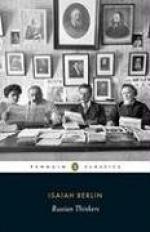|
This section contains 586 words (approx. 2 pages at 400 words per page) |

|
Fathers and Children: Turgenev and the Liberal Predicament Summary and Analysis
The precautions the Tsarist government took over the funeral of Ivan Turgenev in 1883, two years after the Assassination of Alexander II, may surprise those who see Turgenev as an apolitical writer of lyrical prose and quietly-observed moments. But although the authorities were correct that his novels were not "safe," he was not a moral preacher such as Tolstoy and Dostoevsky. Like all Russian writers of his generation, he was deeply concerned about the condition of his society. He had been deeply influenced by Belinsky's diatribes against everything dark and false in Russia and had listened to Bakunin's Hegelian sermons. But he was not comfortable in any rigid ideology.
But Turgenev had an un-Russian gift for what Keats called negative capability, an ability to enter into views and...
(read more from the Fathers and Children: Turgenev and the Liberal Predicament Summary)
|
This section contains 586 words (approx. 2 pages at 400 words per page) |

|




